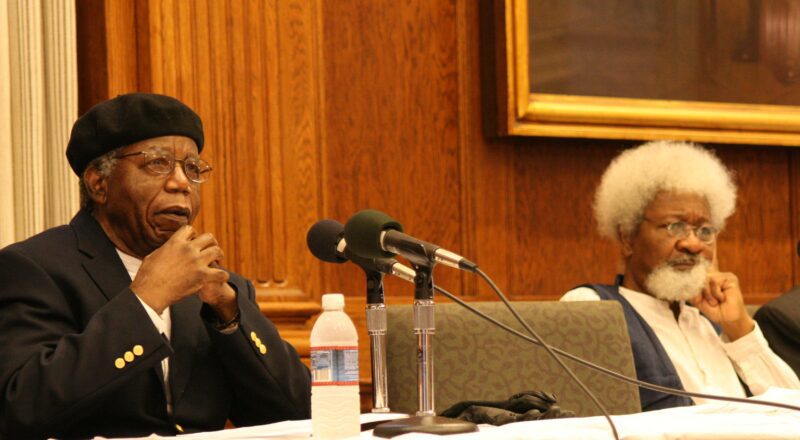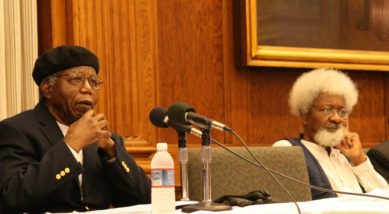National Issues
PROFESSOR WOLE SOYINKA OR LATE PROFESSOR CHINUA ACHEBE: YOU DECIDE!

Admired by many, the dynamic duo of Soyinka and Achebe are one of a kind, a total blessing to the continent of Africa and the world at large. Hence, there contribution to the world of knowledge can never be undermined in any corner of the world; they both stand head and shoulder above their peers in literary work in Africa and rob shoulders with the best in the world.
But like it has always been in a world of two good people, there must be one that is better! Look at their work stats and make a pick:
Late Professor Chinua Achebe:
Late Professor Albert Chinualumogu Achebe was a top Nigerian novelist, poet, and critic. He was best known for his first novel and magnum opus, Things Fall Apart (1958), which is the most widely read book in modern African literature. From 2009 until his death, he served as a professor at Brown University in the United States. Achebe excelled at school and won a scholarship for undergraduate studies. He became fascinated with world religions and traditional African cultures and began writing stories as a university student.
He gained worldwide attention for Things Fall Apart in the late 1950s; his later novels include No Longer at Ease (1960), Arrow of God (1964), Chike and the River (1966), A Man of the People (1966), and Anthills of the Savannah (1987), The Trouble with Nigeria (1983) and most recently There was a Country called Nigeria, the True Story of Biafra (2013). Achebe wrote his novels in English and defended the use of English, a “language of colonisers”, in African literature. In 1975, his lecture An Image of Africa: Racism in Conrad’s “Heart of Darkness” featured a famous criticism of Joseph Conrad as “a thoroughgoing racist”; it was later published in The Massachusetts Review amid some controversy.
Achebe’s novels focus on the traditions of Igbo society, the effect of Christian influences, and the clash of Western and traditional African values during and after the colonial era. His style relies heavily on the Igbo oral tradition, and combines straightforward narration with representations of folk stories, proverbs and oratory. He also published a number of short stories, children’s books, and essay collections. Achebe published an essay titled Where Angels Fear to Trade (1962) issue of Nigeria magazine, in 1975 he was presented with an honorary doctorate from the University of Stirling and the the Lotus Prize for Afro-Asian Writers, amongst other awards. Achebe was awarded a Rockefeller Fellowship for six month of travel.
The New York Times described him in his obituary as “one of Africa’s most widely read novelist and one of the continent’s towering men of letters”. The BBC wrote that he was “revered throughout the world for his depiction of life in Africa”. Achebe has been called “the father of modern African writing” in 1992 he became the first living writer to be represented in the Everyman’s Library collection published by Alfred A. knopf. Many writers of succeeding generations view his work as having paved the way for their efforts. Achebe was the recipient of over 30 honorary degrees from universities in England, Scotland, Canada, South Africa, Nigeria and the United States, including Dartmouth College, Havard and Brown university. He was awarded the Commonwealth Poetry Prize, the Nigerian National Order of Merit (Nigeria’s highest honour for academic work), the Peace Prize of the German Book Trade and countless number of awards.
Some scholars have suggested that Achebe was shunned by intellectual society for criticising Conrad and traditions of racism in the west. Despite his scholarly achievements and the global importance of his work, Achebe never received a Nobel Prize, which some observers viewed as unjust. When quizzed about how he felt not winning a Nobel Prize; he replied: “My position is that the Nobel Prize is important. But it is a European prize. It’s not an African prize… literature is not a heavyweight championship. Nigerians may think, you know, this man has been knocked out. It;s nothing to do with that.”
Professor, Wole Soyinka:
Professor, Akinwande Oluwole Soyinka is a strong Nigerian writer, notable especially as a playwright and poet; he was awarded the 1986 Nobel Prize in Literature, the first person in Africa and the diaspora to be so honoured. Much of his writing has been concerned with “the oppressive boot and the irrelevance of the colour of the foot that wears it”. He wrote plays that were produced in both countries, in theaters and on radio. He took an active role in Nigeria’s political history and its struggle for independence from Great Britain. He was a professor first at Cornell University and at Emory University in Atlanta, United States, were in 1966 he was appointed Robert W. Woodruff Professor of the Arts.
Soyinka intended to write new work combining European theatrical traditions with those of his Yoruba cultural heritage. His first major play, the Swamp Dwellers (1958), was followed a year later by The Lion and the Jewel, a comedy that attracted interest from several members of London’s Royal Court Theater. In 1957 his play The Invention was the first of his works to be produced at the Royal Court Theatre. At that time his only published works were poems such as “The Immigrant” and “My Next Door Neighbour”, which were published in the Nigerian Magazine Black Orpheus. This was founded in 1957.
Soyinka received a Rockefeller Research Fellowship from University College in Ibadan, his alma mater, for research on African theatre, and he returned to Nigeria. He produced his new satire, The Trial of Brother Jero, Death and the King’s Horseman and The Beatification of Area Boy. His work A Dance of The Forest (1960), a biting criticism of Nigeria’s political Independence Day. At the end of 1963, his first feature-length movie, Culture in Transition, was released. In April 1964 The Interpreters, “a complex but also vividly documentary novel”, was published in London. In 1964 he wrote two dramatic pieces: Before the Blackout and the comedy Kongi’s Harvest (1970). He also wrote The Detainee, a radio play for the BBC in London.
His play The Road was awarded the Grand Prix. In June 1965, Soyinka produced his play The Lion and The Jewel for Hampstead Theatre Club in London.
At a friend’s farm in France, he wrote The Bacchae of Euripides (1969) a reworking of the Pentheus myth. He soon published in London a book of poetry, Poems from Prison. He also wrote another play Madman and Specialists. He published countless of playwright and was decorated with several awards for his works most notable is the Nobel Prize for Literature in 1986, becoming the first African laureate. He was described as one “who in a wide cultural perspective and with poetic overtones fashions the drama of existence”.
Prof. Soyinka and Achebe’s work are not so far apart. Indeed they are both great achievers in their chosen field, with the emergence of countless young writers, the likes of Mrs. Chimamanda Ngozi Adichie. The marathon race is inch away from completion for both legend in the game and the time is right to separate the two and pick a king.
Do your analysis and make a pick.



















Ifeanyi Ugwu
October 8, 2014 at 7:55 pm
Wow! Achebe a renowned story teller whose tales resonates the world over. Wole the playright maestro whose poetry is an embodiment of his inner poetic justice hence being African’s acclaimed dramatist.